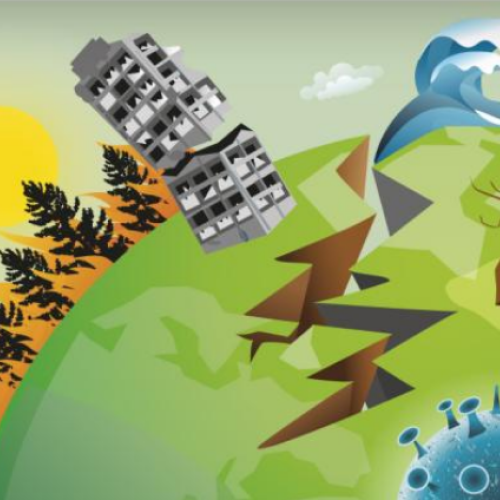What does it finance?
Its overall objective is to strengthen the knowledge and capacities of countries under the Union Civil Protection Mechanism (UCPM) for disaster prevention and preparedness with a focus on:
- Strengthening the capacity: Of civil protection and other relevant competent authorities in scaling up disaster and climate resilience in line with the Union Disaster Resilience Goals and the European Green Deal, as well as the countries’ national priorities.
- Supporting investments: In disaster prevention and preparedness through the development of a project pipeline and enhanced administrative capacity.
- Improving the knowledge base: On disaster risk management, and facilitate the sharing of knowledge, good practices and information.
TAFF is a mechanism which allows national civil protection and disaster risk management authorities to access technical assistance and global knowledge on prevention and preparedness to support country efforts on disaster risk management (DRM). Strengthening financial resilience, making smart investments for disaster and climate resilience, and enhancing institutional capacity and preparedness makes economic sense. To be better prepared for disasters, there is a need to scale up investments to bolster disaster prevention and preparedness across the EU and through the Union Civil Protection Mechanism., TAFF is aligned with:
- The European Union Disaster Resilience Goals, which focus on enhancing UCPM response capacity, strengthening crisis and emergency preparedness of civil protection, improved risk analytics, anticipation and planning, enhanced early warning systems, and increased risk awareness of the population.
- The World Bank’s strategy in the Europe and Central Asia (ECA) region, which focuses on supporting a green transition, building resilience, and strengthening institutions.
- The GFDRR mission to support communities and countries to reduce risk, prepare for, and recover from disaster by integrating DRM and climate change adaptation into development strategies and programs, and contributing to country efforts in the implementation of the Sendai Framework for Disaster Risk Reduction 2015-2030.
Which authorities are responsible for this instrument?
TAFF is fully funded by the European Union and managed by the Global Facility for Disaster Reduction and Recovery (GFDRR).
Activities are implemented by World Bank teams from the Europe and Central Asia Disaster Risk Management and Urban Resilience unit of the World Bank, and GFDRR's global experts. Implementation is conducted in coordination with the European Commission Directorate-General for Civil Protection and Humanitarian Aid Operations (DG ECHO).
TAFF projects will also be implemented in coordination with relevant stakeholders involved in disaster and climate resilience in the region.
The Union Civil Protection Knowledge Network will also contribute to sharing good practices and knowledge from TAFF.
What kind of funding does it provide?
TAFF has an annual indicative financial envelope of EUR 4 million and two components:
1. Country-specific technical assistance to strengthen the capacity of civil protection and other relevant competent authorities under the UCPM in scaling up investments contributing to disaster and climate resilience. Technical assistance includes various types of analytics, technical studies and recommendations for plans and strategies, piloting of activities, and capacity-building/training activities. Key areas of support include:
- Anticipate: Improving anticipation and disaster risk management planning to proactively address potential hazards.
- Prepare: Raising risk awareness and preparedness levels among the population to effectively respond to emergencies.
- Alert: Enhancing early warning and hydro-meteorological systems for timely and accurate information dissemination.
- Secure: Strengthening national civil protection systems to strengthen to prevent and prepare for disasters.
2. Knowledge and capacity building to facilitate the transfer and sharing of knowledge among countries on disaster risk management and facilitate the sharing of good practices across UCPM countries. Knowledge products and activities include, for example, studies, collection of best practices and lessons learned, practical guidance/knowledge notes, interactive workshops and technical deep dives/clinics, and training programmes.
Which countries are eligible?
EU Member States and other participating states in the Union Civil Protection Mechanism: Albania, Bosnia and Herzegovina, Iceland, the Republic of Moldova, Montenegro, North Macedonia, Norway, Serbia, Türkiye and Ukraine. In addition, Kosovo* is also eligible to apply under this call.
*This designation is without prejudice to positions on status and is in line with UNSCR 1244/1999 and the ICJ Opinion on the Kosovo Declaration of Independence.
Who is this call for?
National level civil protection authorities or authorities with disaster risk management (DRM) responsibilities of eligible countries.
How to apply
Expressions of Interest and Shortlisting: Eligible entities can respond to a Call of Expressions of Interest (EoI) which will be published on DG ECHO and GFDRR websites. The EOI will be reviewed on annual basis within defined timeframes. Proposals outside this range, particularly due to emergency situations, will be considered on a case-by-case basis.
The third call for Expression of Interest will open in early 2026.
Proposals and start of activities: Based on the approved shortlist, World Bank/GFDRR, in coordination with beneficiary country and entity develops a full proposal for the proposed activities, and World Bank teams start implementation.
Project duration is expected between 18 and 24 months.
Coordination and reporting: The World Bank/GFDRR teams implement activities in coordination with the beneficiary, and disseminate knowledge and lessons learned.
Knowledge and capacity building: The selection of knowledge and capacity building activities will consider country-specific activities and topics of interest that are relevant and can benefit UCPM countries in terms of knowledge transfer.
Project examples
2024 Projects:
2025 Projects:
